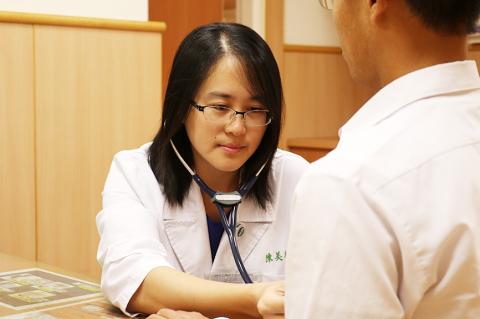Over the past five years, National Health Insurance spending has increased to NT$4.8 billion (US$155.3 million), while the number of people treated for myocardial infarction has risen 38 percent and the age of patients has decreased, demonstrating that the condition is no longer limited to the elderly.
Ministry of Health and Welfare statistics showed that 48,639 people last year visited medical establishments complaining of myocardial infarction, commonly known as a heart attack.
Men comprised 77 percent of the visits.

Photo: Ou Su-mei, Taipei Times
While nearly half, or 24,247 people, were aged 50 to 69, 13.1 percent, or 6,384 people, were younger than 49, while 148 were younger than 30, the statistics showed.
Mackay Memorial Hospital deputy superintendent Yeh Hung-yi (葉宏一) yesterday said that an increasing number of younger patients have been treated for myocardial infarction.
Citing an unspecified study, Yeh said that 70 percent of myocardial infarction patients younger than 40 have a habit of smoking.
Smoking increases blood pressure and the concentration of blood platelets, which could cause thrombosis and contributes to a person’s risk of myocardial infarction, Yeh said.
Taiwan Society of Lipids and Atherosclerosis director Lee Yi-heng (李貽恆) said that the “three hypers” — hyperglycemia, hyperlipidemia and hypertension — also contribute to myocardial infarction.
From 2009 to 2015, the number of men younger than 55 who experienced a heart attack increased 30.3 percent, Lee said, adding that for women the figure increased 29.4 percent.
Theoretically, estrogen secreted by women prior to menopause protects their arteries, Lee said, adding that the theory has yet to be proven.
While there have been fewer people with diabetes or high blood pressure, there has been an increase with hyperlipidemia, Lee said.
Doctors said that smokers who have symptoms of the three hypers have an increased chance of myocardial infarction when placed under duress, work long hours or if their environment changes.
Rapid schedule changes, such as shifting between day and night work shifts, is a risk, doctors said, adding that drinking at night and waking to work would also increase blood pressure.
Chest pains or cold sweats are symptoms of myocardial infarction, and people should visit a doctor or hospital as soon as possible if they experience them, doctors said.

Taiwanese can file complaints with the Tourism Administration to report travel agencies if their activities caused termination of a person’s citizenship, Mainland Affairs Council Minister Chiu Chui-cheng (邱垂正) said yesterday, after a podcaster highlighted a case in which a person’s citizenship was canceled for receiving a single-use Chinese passport to enter Russia. The council is aware of incidents in which people who signed up through Chinese travel agencies for tours of Russia were told they could obtain Russian visas and fast-track border clearance, Chiu told reporters on the sidelines of an event in Taipei. However, the travel agencies actually applied

Japanese footwear brand Onitsuka Tiger today issued a public apology and said it has suspended an employee amid allegations that the staff member discriminated against a Vietnamese customer at its Taipei 101 store. Posting on the social media platform Threads yesterday, a user said that an employee at the store said that “those shoes are very expensive” when her friend, who is a migrant worker from Vietnam, asked for assistance. The employee then ignored her until she asked again, to which she replied: "We don't have a size 37." The post had amassed nearly 26,000 likes and 916 comments as of this

New measures aimed at making Taiwan more attractive to foreign professionals came into effect this month, the National Development Council said yesterday. Among the changes, international students at Taiwanese universities would be able to work in Taiwan without a work permit in the two years after they graduate, explainer materials provided by the council said. In addition, foreign nationals who graduated from one of the world’s top 200 universities within the past five years can also apply for a two-year open work permit. Previously, those graduates would have needed to apply for a work permit using point-based criteria or have a Taiwanese company

The Shilin District Prosecutors’ Office yesterday indicted two Taiwanese and issued a wanted notice for Pete Liu (劉作虎), founder of Shenzhen-based smartphone manufacturer OnePlus Technology Co (萬普拉斯科技), for allegedly contravening the Act Governing Relations Between the People of the Taiwan Area and the Mainland Area (臺灣地區與大陸地區人民關係條例) by poaching 70 engineers in Taiwan. Liu allegedly traveled to Taiwan at the end of 2014 and met with a Taiwanese man surnamed Lin (林) to discuss establishing a mobile software research and development (R&D) team in Taiwan, prosecutors said. Without approval from the government, Lin, following Liu’s instructions, recruited more than 70 software